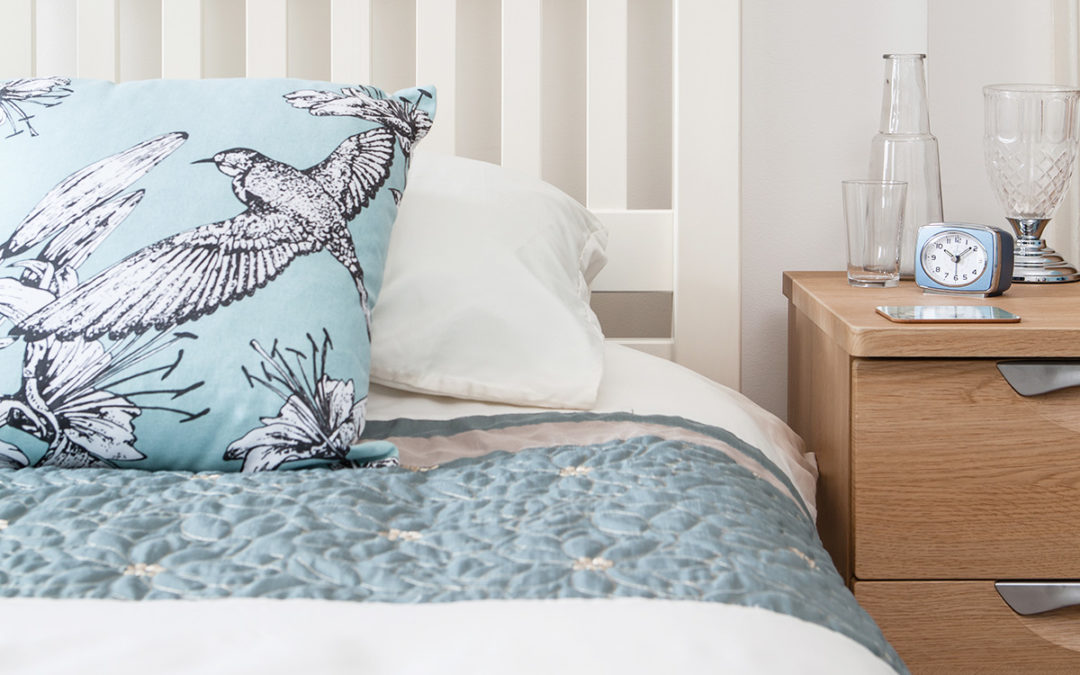Catherine Singh, Home Manager at Lulworth House Residential Care Home, recently asked if I would help advise on a sleep trial. The intention behind the trial was to implement gentle, holistic elements during the evening to help residents who find it difficult to settle and sleep through the night.
The outcomes of the trial were based on staff observations and whether they noticed changes in residents who would usually not sleep and settle at night.
There are many benefits to promoting sleep through diet and well-being:
- Helping the person to be more refreshed the next day
- Preventing falls
- Reduces feelings of anxiety
- Helping the person to be more settled, making it a less stressful night for residents and staff
- Lifts mood and overall well-being
- Supports the immune system to work better.
The aim was to adapt the environment and to offer different drinks and foods on the nighttime tea round to help calm and settle residents.
The environment was changed by introducing salt lamps which omit a warm glow and give the impression of fire which is known to induce the sleep hormone melatonin. Essential oil diffusers were also introduced which diffused sleepy scents such as lavender.
Night trolley
The team stocked their night trolley with certain foods which were sleep promoting; here are some of the basic tips I offered to support sleep:
- Decaffeinated teas and coffees available after 6pm, including herbal teas, in particular chamomile and passionflower
- Milky drinks such as hot chocolate, Horlicks and Ovaltine should be made with milk only and not diluted with water. The density of the milk will help someone to feel fuller for longer and will help them to settle all through the night.
- Protein-rich suppers and snacks help to make an individual feel fuller for longer and can help them to settle and sleep through the night. Protein can be found in all meat and fish, natural yoghurt, eggs, nuts (as always check for allergies) and seeds.
- Kiwi fruit. Eating a kiwi fruit or two before bed can help with sleep. Include these, peeled and sliced, on the trolley.*
- Bananas contain properties that may help induce a good night’s sleep.
- Oats are high in carbs with fibre and have been reported to induce drowsiness when consumed before bed.
To reap the benefits of sleep-enhancing foods and drinks, it may be best to consume them 2–3 hours before bed. Eating immediately before going to sleep may cause digestive issues, such as acid reflux.
* It was agreed that the kiwi fruit wouldn’t suit the tastes of residents at Lulworth as they had tried it in various forms before.
Daytime snacks
Daytime staff made flapjacks, banana flapjacks, banana bread and oat and banana muffins on alternate nights for the nighttime tea trolley.
There were also various milky drinks on offer and sandwiches containing egg and different meats like turkey. Decaffeinated tea and coffee were offered after 6pm.
The outcome
The trial ran for six weeks and the implemented changes continue to be in place at Lulworth House as they seemed to work well. Night staff feedback included:
- The salt lamps and diffuser did seem to improve the environment; however, staff were not convinced that they had a huge impact on how well they settled residents overall.
- When asked if the food and drink offered made a difference, they agreed that they felt it had and they saw a noticeable change; that certain residents were more settled, slept better and slept for longer.
This just goes to show that through a few simple adjustments we can improve the quality of sleep for some people and, in turn, their overall quality of life.
Overall it was a successful trial that did appear to result in better and longer sleep for some residents, and the successful ideas can certainly be developed and shared amongst our other Homes.




